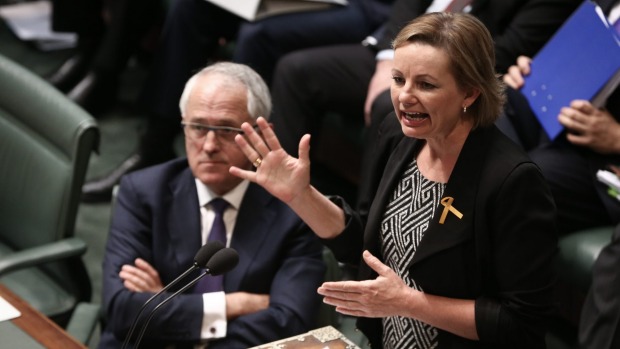
Sussan Ley said “consumers across the country were in my ear” about the declining value of their private health insurance and she was listening. Alex Ellinghausen
Health Minister Sussan Ley is considering changes to the means-tested rebate for private health insurance as part of a larger policy response to complaints about the soaring cost and poor value for money of private cover.
It is unlikely, however, the full 30 per cent rebate would be reinstated for people on all incomes. It is understood other measures to try and control the cost of cover, such as lowering the cost of services the insurers buy, are also in the pipeline.
The 30 per cent rebate was introduced by the Howard government in 2000 and within a decade, became the fastest-growing contributor to the budget’s structural deficit.
Labor Treasurer Wayne Swan introduced a means test with the support of the Greens which saved $2.4 billion over four years but the savings was many times that over future years.

The 2009 intergenerational report found the cumulative cost of leaving the 30 per cent private health insurance rebate without a means test would be $100 billion by 2049, money which Labor argued should be spent on public health.
The Coalition opposed the means test but did support two other measures, including indexing the means-tested rebate to inflation rather than premium increases.
In all, Labor’s measures “saved” $3.5 billion, roughly the same amount Ms Ley is now trying to find from public health by looking for efficiencies in Medicare by reviewing 5700 services.
Before the last election, Tony Abbott promised to abolish the means test once the budget was back in “strong surplus”.
Ms Ley told The Australian Financial Review “consumers across the country were in my ear” about the declining value of their private health insurance and she was listening.
“Consumers are telling me Labor’s cuts are eroding the value of the private health rebate and in turn pushing up their out of pocket costs or forcing them to downgrade,” Ms Ley said.
“Whether Labor likes it or not, millions of Australians consider private health insurance an important part of the healthcare mix in this country.”
A COG IN THE MACHINE
She cautioned that the rebate was just one element of a complex private health system with “many moving parts”.
“Labor’s cuts have showed us you can’t just look at the private health rebate in isolation and expect it won’t have negative knock-on effects for the rest of the system, particularly consumers, who are often at the end of the line.”
She did confirm separately on Monday that the savings made from Medicare would be used to both tackle the budget deficit and be reinvested in public health. Her spokesman said Medicare savings would not be used to help pay for a bigger private health rebate.
Opposition spokeswoman on health Catherine King told the Financial Review that means testing the rebate was one of the tough decisions Labor took in government to allow better funded public healthcare.
“This change is one of the single biggest contributions to improving the health budget,” she said.
“On the same day [Ms Ley] has confirmed she is cutting money out of Medicare to prop up the budget, it’s unthinkable she would also be considering cutting money out of the public health system to reverse labor’s reforms.”
Ms Ley has been consulting the industry and other stakeholders. Her predecessor Peter Dutton had floated the idea of allowing private providers to fund primary care such as GP visits but Ms Ley declined to endorse that.
“Half the population now has some form of private health insurance and I’ve begun talking to consumers, insurers and the health sector about how to best ensure this good work is not undone by Labor’s bad policy decisions.”
